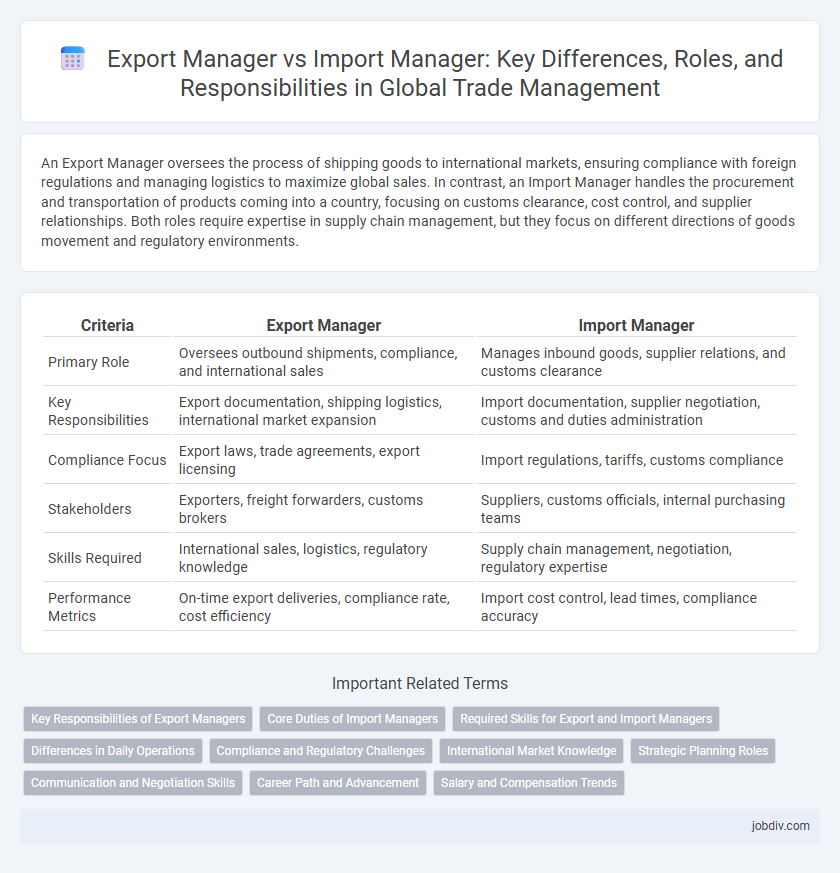An Export Manager oversees the process of shipping goods to international markets, ensuring compliance with foreign regulations and managing logistics to maximize global sales. In contrast, an Import Manager handles the procurement and transportation of products coming into a country, focusing on customs clearance, cost control, and supplier relationships. Both roles require expertise in supply chain management, but they focus on different directions of goods movement and regulatory environments.
Table of Comparison
| Criteria | Export Manager | Import Manager |
|---|---|---|
| Primary Role | Oversees outbound shipments, compliance, and international sales | Manages inbound goods, supplier relations, and customs clearance |
| Key Responsibilities | Export documentation, shipping logistics, international market expansion | Import documentation, supplier negotiation, customs and duties administration |
| Compliance Focus | Export laws, trade agreements, export licensing | Import regulations, tariffs, customs compliance |
| Stakeholders | Exporters, freight forwarders, customs brokers | Suppliers, customs officials, internal purchasing teams |
| Skills Required | International sales, logistics, regulatory knowledge | Supply chain management, negotiation, regulatory expertise |
| Performance Metrics | On-time export deliveries, compliance rate, cost efficiency | Import cost control, lead times, compliance accuracy |
Key Responsibilities of Export Managers
Export Managers oversee international shipping logistics, ensuring products comply with export regulations and customs requirements to optimize global market penetration. They coordinate with sales, production, and freight forwarding teams to manage documentation, negotiate contracts, and resolve logistical issues. Their role is pivotal in maximizing export revenue while maintaining adherence to trade policies and minimizing shipment delays.
Core Duties of Import Managers
Import Managers oversee the efficient procurement and transportation of goods from international suppliers, ensuring compliance with customs regulations and import laws. They coordinate logistics, manage vendor relationships, and handle documentation such as bills of lading and import licenses to avoid delays and minimize costs. Their core duties also include monitoring supply chain risks and optimizing inventory levels to support business operations.
Required Skills for Export and Import Managers
Export managers require strong knowledge of international trade regulations, proficiency in export documentation, and excellent negotiation skills to manage overseas sales effectively. Import managers must possess expertise in customs regulations, supplier coordination, and risk management to ensure smooth inbound logistics and compliance. Both roles demand strong communication skills, attention to detail, and the ability to analyze market trends for optimized global supply chain operations.
Differences in Daily Operations
Export Managers coordinate outbound shipments by managing documentation, customs compliance, and logistics to ensure timely delivery to international clients. Import Managers handle inbound shipments, focusing on supplier coordination, customs clearance, and inventory management to maintain smooth supply chain flow. The core difference lies in Export Managers optimizing outbound processes, whereas Import Managers concentrate on efficient intake and compliance of incoming goods.
Compliance and Regulatory Challenges
Export Managers navigate stringent international export controls and licensing requirements, ensuring products comply with destination country regulations and trade sanctions. Import Managers handle customs clearance, tariffs, and adherence to local import laws, managing risks related to duty classification and documentation accuracy. Both roles demand in-depth knowledge of global trade compliance to mitigate legal penalties and maintain supply chain integrity.
International Market Knowledge
Export Managers possess in-depth knowledge of foreign market regulations, customs procedures, and international trade compliance, enabling them to effectively navigate export documentation and logistics. Import Managers specialize in understanding tariff classifications, import restrictions, and supply chain coordination to ensure smooth entry of goods into domestic markets. Both roles require expertise in international market trends and cross-border negotiation to optimize global trade operations.
Strategic Planning Roles
Export Managers focus on strategic planning related to market entry, compliance with international trade regulations, and optimizing distribution channels to maximize global market penetration. Import Managers strategically plan supplier selection, cost control, and logistics coordination to ensure efficient inbound operations and mitigate risks in the supply chain. Both roles require alignment with overall business objectives, but Export Managers emphasize outward market expansion while Import Managers prioritize secure and cost-effective sourcing.
Communication and Negotiation Skills
Export Managers excel in cross-cultural communication and negotiation to secure international deals, emphasizing language proficiency and understanding of foreign market regulations. Import Managers prioritize supplier relationship management and negotiation strategies to optimize cost-efficiency, focusing on compliance with domestic customs and logistics coordination. Both roles demand strong interpersonal skills but differ in their negotiation contexts, with Export Managers engaging clients abroad and Import Managers coordinating with global suppliers.
Career Path and Advancement
Export Managers typically advance by developing expertise in international market expansion and logistics optimization, often progressing to senior roles such as International Sales Director or Global Supply Chain Manager. Import Managers focus on regulatory compliance and supplier relationship management, with career growth leading to positions like Procurement Director or Head of Compliance. Both paths require strong negotiation skills and cross-cultural communication, but Export Managers may experience faster advancement through revenue-driven targets.
Salary and Compensation Trends
Export Managers typically earn higher salaries than Import Managers due to their role in driving revenue growth through international sales and market expansion. Compensation trends indicate that Export Managers often receive performance-based bonuses and commission structures tied to export volume and sales targets, whereas Import Managers' pay is more stable with additional benefits linked to supply chain efficiency and cost control. Industry reports show median salaries for Export Managers range from $70,000 to $110,000 annually, while Import Managers earn between $60,000 and $95,000, reflecting demand differences and skill specialization in global trade management.
Export Manager vs Import Manager Infographic

 jobdiv.com
jobdiv.com